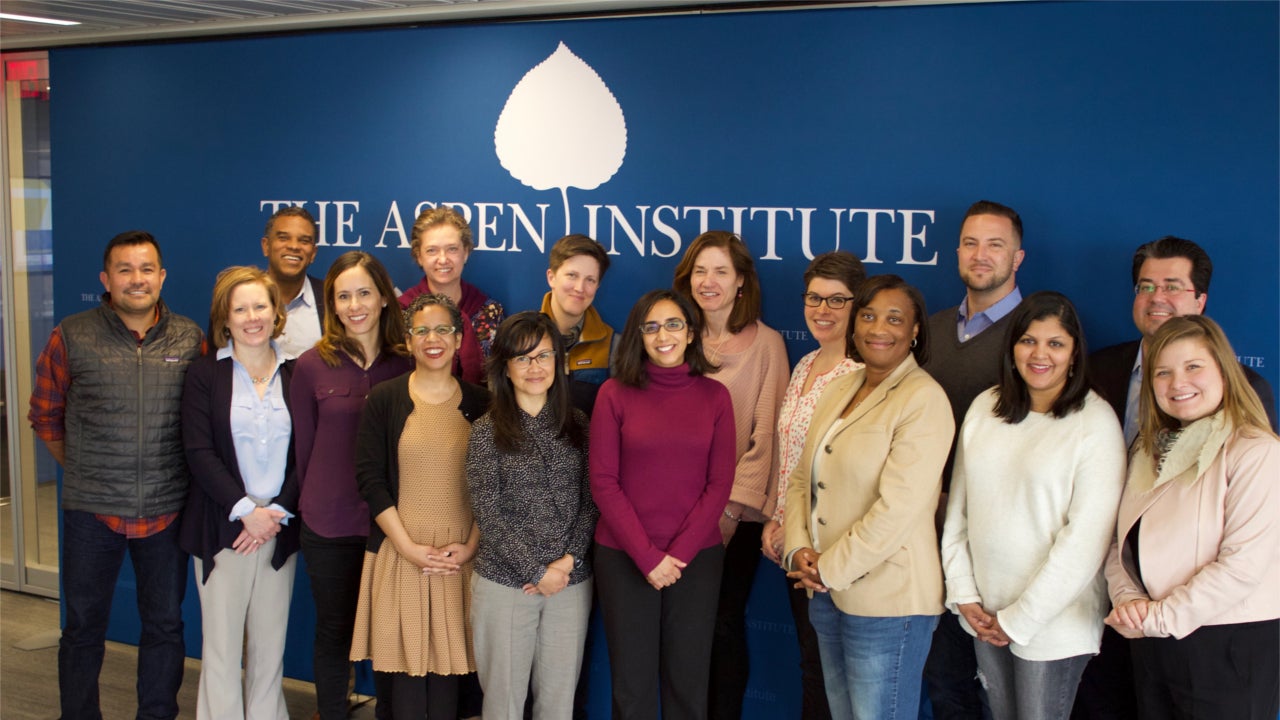Job Quality Fellow, Class of 2017-18
President and CEO, Commonwealth Corporation

What is the job quality challenge you are seeking to address?
In America, people are looking for some simple things. They want a job that enables them to earn a good enough wage so they can support their families and build wealth. And they want a career with an advancement pathway. It sounds simple, but it doesn’t happen for far too many people, both in America and in Massachusetts, where I work. The challenge is to create a reality where these components are reflected in every job our economy has to offer, and that’s part of what we do at Commonwealth Corporation.
Describe Commonwealth Corporation’s work related to job quality.
The organization I lead, Commonwealth Corporation, is a public-private corporation that is part of the executive branch of the Massachusetts state government. We administer a wide variety of programs and initiatives to help businesses hire and retain skilled workers and increase the skills of their current workers, as well as a wide range of youth programs.
One of the big programs we manage is the Workforce Training Fund. Supported by a state surcharge on employer contributions to unemployment insurance, the Fund awards more than $20 million in competitive training grants each year to Massachusetts employers of all sizes and in a range of industries. Employers improve productivity and competitiveness due to the increased skills of their workers. Workers benefit by gaining new skills that are transferable. In most cases, they also gain increased wages as a result of their companies’ improved competitiveness. So, through this work we advance important components of job quality.
What are examples of how employers use the Workforce Training Fund?
Employers can apply to the Fund to train current employees in ways that improve workplace productivity while preparing employees for new positions, or to build employers’ capacity to create new positions. For example, one of our recent grantees, food manufacturer Home Market Foods, partnered with Massasoit Community College and the Massachusetts Manufacturing Extension Partnership to train workers in lean process improvement and leader effectiveness training. The training resulted in increased production runs and decreased downtime, reducing labor costs by 3 percent per pound of goods. In turn, the company increased wages by 3 percent for its 157 trainees. Home Market Foods also told us that a workplace ESOL training it provided to workers through the grant has led to a safer work environment for staff.
While most employers that receive grants from the Fund are from industries such as manufacturing, professional, scientific and technical services, some of our most interesting grants related to job quality have taken place with businesses in the food service sector. For instance, one of our recent grantees, Paris Creperie, used the grant to provide Open Book Management training, which engages employees at all levels to learn about a business’s financial performance and identify new ways to minimize costs. As the Boston Globe reported, net operating margins at Paris Creperie increased to 5.5 percent following the training, almost two percentage points above the national average for restaurants. Due to the increased profits, the restaurant’s 22 workers received quarterly bonuses totaling $6,000 for each full-time worker over the course of the year. The Open Book Management training provider, Henry Patterson of ReThink Restaurants, also described an increase in engagement across staff, who share in decision making as well as profits.
As you can see, our grant to Paris Creperie has advanced many of the components we think of when we think of job quality. Consequently, we’ve awarded Open Book Management training grants to several more restaurants, each of which has committed to sharing resulting increased profits with their workers. The increased skills and knowledge also provide the workers with opportunities for advancement.
How do you make job quality a focus of the training program?
As established by the Massachusetts legislature, the Workforce Training Fund places equal emphasis on business competitiveness and benefit to workers. That’s important, because it positions employers as important players and positive forces for advancing job quality.
Employers’ objectives for training tend to be to help strengthen their bottom line, and that’s good from our perspective. But we’re also focused on linking our investments in training to business commitments to wage increases and job creation. So embedded in the application requirements and review processes are questions about the extent to which the training program will also advance dimensions of job quality, such as wages, employee retention, and acquisition of marketable skills.
Over the course of the grant period, we track whether our investment is generating results through an internal reporting process, and we conduct regular check-ins and site visits with businesses to validate reporting. We draw on the expertise of our staff to provide ongoing technical assistance to businesses.
We also embed accountability as part of this process, revising or ending programs if businesses are not utilizing training dollars or meeting goals.
Tell us about the partnership Commonwealth Corporation and Governor Baker’s administration has formed with the Federal Reserve Bank of Boston.
We’re very excited that Commonwealth Corporation, Governor Charlie Baker’s administration, and the Federal Reserve Bank of Boston will be partnering on a new initiative this year. This came about through conversations with Anjali Sakaria, one of my peer Job Quality Fellows, and her work with the Federal Reserve Bank of Boston.
In the first stage of the initiative, the Federal Reserve Bank of Boston and Commonwealth Corporation plan to conduct interviews and focus groups with a set of Massachusetts businesses across different industries. Through this engagement, we hope to learn about businesses’ needs and goals related to job quality, past efforts businesses have undertaken that have been successful, barriers or challenges businesses have faced, and how these vary from sector to sector. By partnering with the Boston Fed, we’ll build on the learning we’ve acquired through the Workforce Training Fund over the years while benefiting from a more rigorous, analytical lens to understand the job quality landscape across employers in Massachusetts.
In the second phase of the initiative, we plan to use what we have learned to inform policy and practice. On the policy side, we expect to make policy recommendations to the Baker administration that will support businesses and workers. On the programmatic side, we plan to use knowledge gained from the interviews and focus groups to enhance the services Commonwealth Corporation provides to businesses. We have high expectations for this initiative, and hope it will become another significant way Commonwealth Corporation advances quality jobs across Massachusetts.
Share now
Tweet “People are looking for some simple things. They want a job that enables them to earn a good enough wage so they can support their families and build wealth. And they want a career with an advancement pathway.” @JDLaRock
Tweet “We have high expectations for this initiative, and hope it will become another significant way Commonwealth Corporation advances quality jobs across Massachusetts.” @JDLaRock
Tweet “The Workforce Training Fund places equal emphasis on business competitiveness & benefit to workers. That’s important, because it positions employers as important players & positive forces for advancing job quality.” @JDLaRock
Keep in touch
Learn how the Aspen Institute Economic Opportunities Program is helping low- and moderate-income Americans connect to and thrive in a changing economy. Follow us on social media and join our mailing list to stay up-to-date on publications, blog posts, and other announcements.
We are grateful to the Ford Foundation and The Prudential Foundation for their support of this work.
